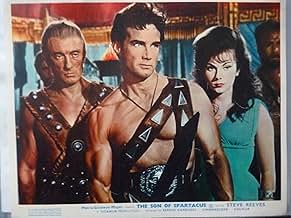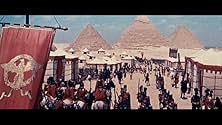Durante la spedizione in Egitto, Giulio Cesare invia in Asia minore il centurione Rando. Costui scopre di essere figlio di Spartaco, il gladiatore ribelle, e guida i ribelli conto Marco Lici... Leggi tuttoDurante la spedizione in Egitto, Giulio Cesare invia in Asia minore il centurione Rando. Costui scopre di essere figlio di Spartaco, il gladiatore ribelle, e guida i ribelli conto Marco Licinio Crasso, l'uomo che uccise suo padre.Durante la spedizione in Egitto, Giulio Cesare invia in Asia minore il centurione Rando. Costui scopre di essere figlio di Spartaco, il gladiatore ribelle, e guida i ribelli conto Marco Licinio Crasso, l'uomo che uccise suo padre.
- Regia
- Sceneggiatura
- Star
Ahmed Ramzy
- Murdok - a Lybian Chief
- (as Ahmad Ramzi)
Abdulmuniem Abdulrahman
- Slave
- (non citato nei titoli originali)
Hussein Al-Meliguy
- Slave
- (non citato nei titoli originali)
Abdel Hameed Badawy
- Slave
- (non citato nei titoli originali)
Ala Badruddin
- Rebel Slave
- (non citato nei titoli originali)
Recensioni in evidenza
10jimm-8
By 1970 Son of Spartacus (now out on DVD) found itself relegated to Saturday morning matinées, which is hardly surprising since Steve Reeves here seems to be getting twice as much combat duty as in most of the other Italian epics. So much so, one could hardly miss the kiddies re-enacting his many sword fights on the way home. Grown-ups too had something to admire, especially the eye-catching Ombretta Colli who conveniently gets shipwrecked with Reeves on a beach with her costume cut to shreds. This might prove an embarrassment to Miss Colli in later years when she went into Italian politics, no doubt hoping her voters would not remember her cheesecake days.
However, it is film music fans who have most to cheer, with a score derived from no less than three of the top Italian film composers. While Son of Spartacus was being filmed in Egypt during March and April of 1962, veteran maestro Carlo Innocenzi sadly died (on March 24). His stirring main title can still be heard in the M-G-M release, and it's an impressive full orchestral version of the slow execution march for Princess Elea in Goliath Against the Giants (1961). For the opening scenes M-G-M simply recycle Innocenzi's battle music from Goliath Against the Giants, but the opening narration is accompanied by the lovely "Glauco e Antonino" track from Lavagnino's Last Days of Pompeii (1959). For the rest of the score we get a mixture of new music by Piero Piccioni (a haunting desert tune and a rousing finale march when Reeves ultimately triumphs), plus some prior Piccioni material from Duel of the Titans (1961). The Italian language version (also available on DVD) is scored by Piccioni throughout, with a different main title adapted from "Amulio" in Duel of the Titans. Piccioni's entire score, including some unused cues, can be enjoyed on a CD thanks to those dedicated vault raiders at Digitmovies
However, it is film music fans who have most to cheer, with a score derived from no less than three of the top Italian film composers. While Son of Spartacus was being filmed in Egypt during March and April of 1962, veteran maestro Carlo Innocenzi sadly died (on March 24). His stirring main title can still be heard in the M-G-M release, and it's an impressive full orchestral version of the slow execution march for Princess Elea in Goliath Against the Giants (1961). For the opening scenes M-G-M simply recycle Innocenzi's battle music from Goliath Against the Giants, but the opening narration is accompanied by the lovely "Glauco e Antonino" track from Lavagnino's Last Days of Pompeii (1959). For the rest of the score we get a mixture of new music by Piero Piccioni (a haunting desert tune and a rousing finale march when Reeves ultimately triumphs), plus some prior Piccioni material from Duel of the Titans (1961). The Italian language version (also available on DVD) is scored by Piccioni throughout, with a different main title adapted from "Amulio" in Duel of the Titans. Piccioni's entire score, including some unused cues, can be enjoyed on a CD thanks to those dedicated vault raiders at Digitmovies
From Sergio Corbucci, director of the classic spaghetti westerns "The Great Silence" and "Django," comes a routine, but serviceable Italian sword-and-sandal epic staring Steve Reeves, best know for his many Hercules films. This was Reeves final on-screen appearance in this particular genre, later moving onto pirate and western films. "The Slave" has Reeves cast a Roman soldier who discovers he's actually the son of Spartacus, a slave turned gladiator turned rebel leader against the Roman Empire. Like his father, Reeves ends up leading a slave revolt. Unlike the Stanley Kubrick version of Spartacus, this film is minus interesting characters, dialogue, and narrative. However, Corbucci does bring strong visuals to the film and the production values of "The Slave" is better than most Italian sword-and-sandal pictures, which makes this film worth checking out for fans of these admittedly silly films.
Steve Reeves plays a high-ranking Roman centurion who finds out he's the son of the infamous rebel slave leader and spearheads a revolt, of course, in one of the better "sword & sandal" entries. Mixing the backstory of Moses (instead of a swaddling cloth, an amulet gives him away) with the exploits of a comic book superhero (Reeves sneaks off every now and then to shuck his tunic for dad's face-covering armor), director Corbucci took the tale and ran with it, producing some impressive mise-en-scène amidst his unexpectedly inventive camera-work. Gianna Maria Canale as Crassus' cougar wife does little more than lounge around on divans and ogle our hero but no matter, it's always a pleasure to see her in peplum like this.
One of the better Sword and Sandal movies from the golden era of the genre (the 1960's). Awesome to see Steve Reeves in his prime. If this movie had been made in the 1980's, no doubt Schwarzenegger would have been the lead. Beautifully shot on location in Egypt, the setting really does seem to improve the movie. Lot's of action, plenty of sword fights and cool set pieces. I think what stood out to me the most about this movie was the similarities to the "Zorro" story. Reeve's character is a bit like a super hero, darting off out of view to change in to a costume (son of Spartacus) that hides his true identity. Zorro would leave his mark, a "Z" carved with his sword. Son of Spartacus leaves an "S" carved or painted in to shields and walls to terrorize the abusive governor. It really did strike me as "Zorro" set in Roman times and happening in Egypt. Check out the size of the mole on the neck of the guy that played Caesar. Holy crap, he should have had that thing surgically removed. It was like a vestigial twin living on his shoulder/neck. Grotesque!
Overall, a good sword and sandal movie that I would have loved when I was 8 - 12 years old. Somehow I only just saw this movie for the first time now that I am 45 years old, but I still enjoyed it.
Overall, a good sword and sandal movie that I would have loved when I was 8 - 12 years old. Somehow I only just saw this movie for the first time now that I am 45 years old, but I still enjoyed it.
After the international success of HERCULES, the Steve Reeves Swords-and-Sandals vehicle THE SLAVE clearly had some money spent on its production values -- good costumes and some nice sets to accent good camera lighting abound. The plot, typical of peplum movies, is a mishmosh of themes intended to take advantage of recent hits.
Reeves is a Roman centurion working for the noble Julius Caesar in Rome. He is captured by leopard-skin wearing desert barbarians working for the evil Crassus, escapes, gets captured again, is enslaved, identified as Spartacus' son (hence the movie's Italian title) and leads a slave rebellion.
Director Sergio Corbucci does his usual highly competent job, abetted by the handsome production values that Cinecitta was capable of; kudos especially to director of Photography Enzo Baroni, whose lighting suggests illustrations on parchment. Although the writing never rises above the level of silliness that such cheap epics aspired to, fans of the genre will find plenty to enjoy.
Reeves is a Roman centurion working for the noble Julius Caesar in Rome. He is captured by leopard-skin wearing desert barbarians working for the evil Crassus, escapes, gets captured again, is enslaved, identified as Spartacus' son (hence the movie's Italian title) and leads a slave rebellion.
Director Sergio Corbucci does his usual highly competent job, abetted by the handsome production values that Cinecitta was capable of; kudos especially to director of Photography Enzo Baroni, whose lighting suggests illustrations on parchment. Although the writing never rises above the level of silliness that such cheap epics aspired to, fans of the genre will find plenty to enjoy.
Lo sapevi?
- QuizThis marked the final Italian sword and sandal/mythological muscleman movie to be made by Steve Reeves. He would make several "Sandokan" movies and a spaghetti western before retiring from the screen.
- BlooperThe story takes place during the triumvirate of Crassus, Caesar and Pompey (65-60 BC), but when Crassus talks with Verulus and Randus, with the Sphinx serving as background, it is plain that the monument has already lost its nose - a fact that would take place 1850 years later.
- Citazioni
La schiava Seila: [to Randus] My friend, my life... is you - my love!
- Versioni alternativeThe Italian theatrical version had a 101 minute running time, with minor censorship cuts for violence. The foreign versions, namely the UK (Son of Spartacus), the USA (The Slave), the German (Der Sohn des Spartakus), and the Finish, run over 102 minutes. Although unconfirmed, there are video versions in Italy and France cut to 97 or 95 minutes.
- ConnessioniFeatured in Cheezy Fantasy Trailers (2006)
I più visti
Accedi per valutare e creare un elenco di titoli salvati per ottenere consigli personalizzati
- How long is The Slave?Powered by Alexa
Dettagli
- Tempo di esecuzione1 ora 40 minuti
- Proporzioni
- 2.35 : 1
Contribuisci a questa pagina
Suggerisci una modifica o aggiungi i contenuti mancanti






























